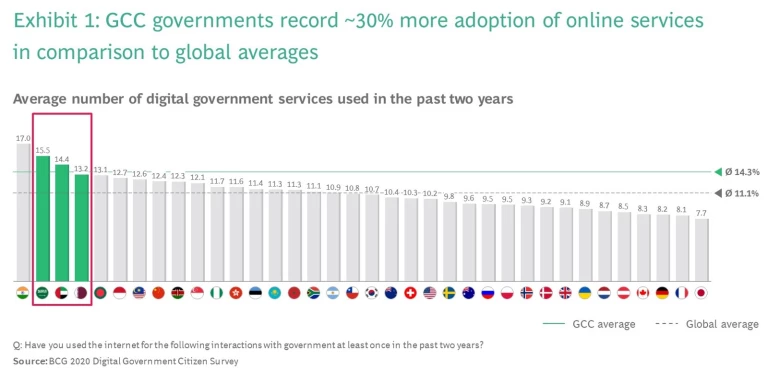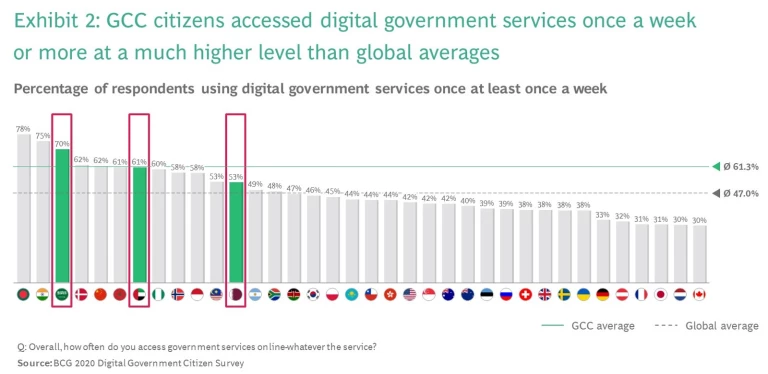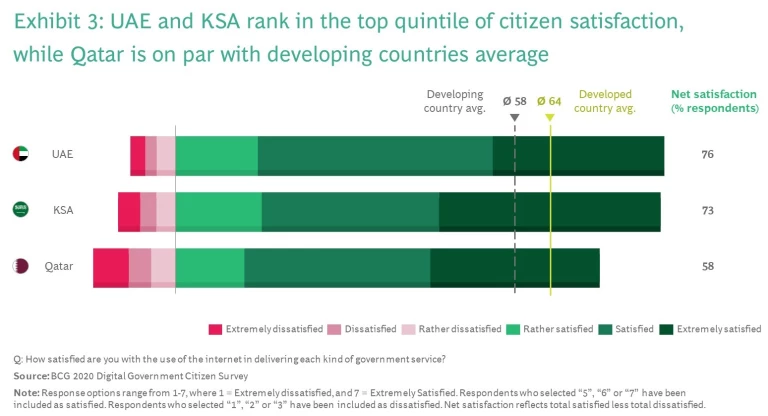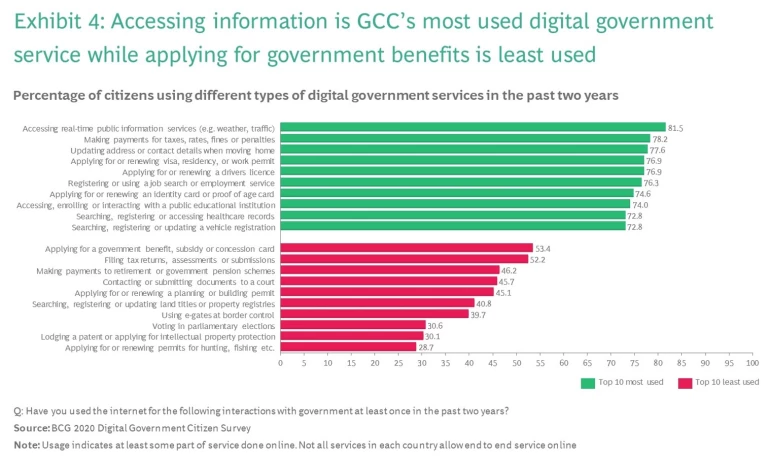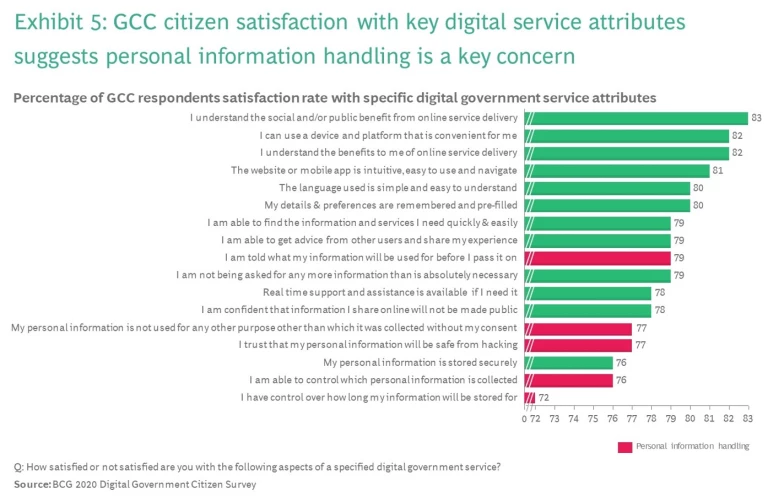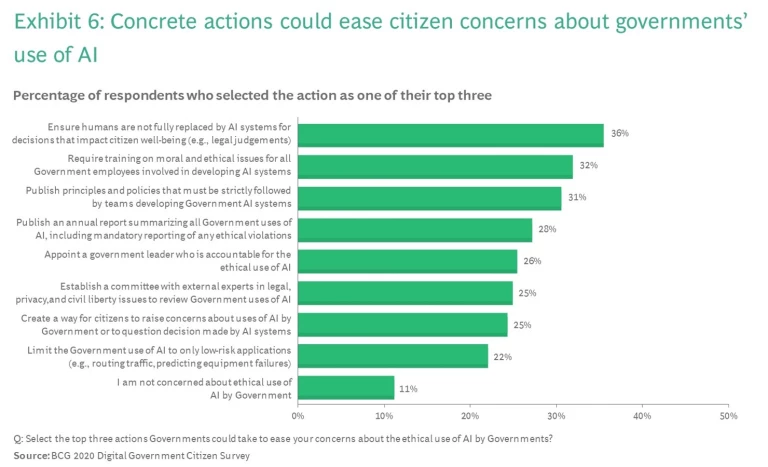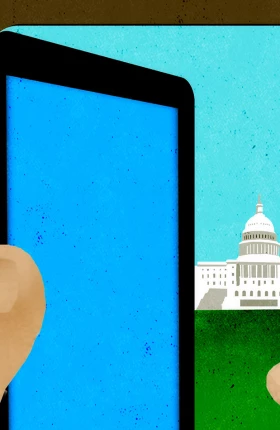Recently, governments have increasingly sought to expand the scope and quality of their online services and keep pace with emerging digital technologies. When done well, citizens and residents appreciate the convenience and flexibility; and governments themselves benefit from improving the efficiency of service provision, leveraging new digital delivery models, and better tailoring these services based on new citizen insights.
The COVID pandemic highlighted the criticality of these digital government services, cementing their enduring status as a post-pandemic priority. It forced governments to react quickly in scaling up new and enhanced services needed to secure citizens’ health, livelihoods, and general wellbeing. Dubai, for example, expanded and tailored UAE PASS
The scope and variety of digital government services grew rapidly, from the simple sharing of COVID information
–
by early April 2020, 167 countries had added information and guidance to their portals
Overall, as expected, the pandemic also accelerated the adoption of digitally enabled government services, speeding up the use of newer offerings (such as telehealth), and fundamentally shifted citizens’ expectations for how services can and should be delivered.
Unique Regional Opportunity for GCC Governments
Accelerated adoption and shifting expectations present several learnings for governments. To start with, this moment represents a unique opportunity for GCC governments to build on their progress to date and an already strong position in key areas, and assume a global leadership role in digital services. In addition to their specific accomplishments, detailed in the next section, they can leverage two key structural strengths to accelerate digitization in the post-COVID world.
- Favorable demographics. Fifty-four percent of GCC citizens are under the age of 25
3 3 https://www.arabnews.com/saudi-arabia/more-half-gcc-population-under-age-25 . As digital natives, they are entirely comfortable with digital services in all areas of their lives and have high expectations in terms of availability, quality, and convenience. This creates a virtuous cycle of strong demand leading to robust adoption, which in turn drives rapid improvement. - A largely urbanized population. Urban dwellers are the most frequent users of online government services, reflecting strong network coverage, higher education levels, and so on. Approximately eighty-five percent of GCC residents live in urban areas
4 4 https://www.worldbank.org/ .
GCC GOVERNMENTS HAVE JOINED THE TOP TIER IN DIGITAL SERVICE OFFERING AND ADOPTION. BCG’s 2020 Digital Government Citizen Survey (DGCS), spanning 36 countries, 26 digital government services, and close to 25,000 individual responses, found that the GCC governments performed strongly in terms of both progress and global ranking.
Driven by a strong foundation, the GCC governments of the Kingdom of Saudi Arabia (KSA), the United Arab Emirates (UAE), and Qatar rose to the top quartile globally for both digital services offered and their adoption. Exhibit 1 shows KSA, UAE, and Qatar ranking 2nd, 3rd, and 4th of all the countries surveyed in the number of digital services they offer. As a group, GCC governments record ~30% more adoption of services available online than the global average (See Exhibit 1).
This digital service offering is met by strong adoption. As shown in Exhibit 2, GCC countries boast an average rate of adoption of 61.3% – more than 30% above the global average. They also rank highly in terms of frequency of access to digital government services. In KSA, for example, respondents who report using a government service at least once a week is ~50% higher than the global average.
INCREASING GCC CITIZEN SATISFACTION IS A SPRINGBOARD FOR FURTHER PROGRESS. BCG’s survey data suggest that the strong adoption of digital government services in GCC may be driven by a high satisfaction rate, in addition to relatively youthful, digitally savvy populations. Exhibit 3 shows UAE and KSA in the top quintile of all surveyed countries (developed and developing) for general satisfaction, with net satisfaction rates of 76% and 73% respectively, and Qatar on par with developing countries averages. Both UAE and KSA results reflect an upward trajectory, with the countries achieving 13% and 14% increases respectively in net satisfaction in the last two years. Both countries have redesigned services to be more user-centered and prioritized their e-government agendas, in line with national transformation priorities (e.g. Vision 2030 in KSA).
Generally, citizens are pleased with the services they receive, with 70% of GCC respondents aged 60+ saying that digital government services met all or most of their needs. But despite progress to date, the study also found room for improvement. The “digital native” younger generations, especially millennials (aged 18-34) are more demanding as they rapidly adopt new services, with only 27% saying that all their needs have been met, compared to 50% for the oldest group.
As shown in Exhibit 4, more than half of those surveyed in the GCC indicated that accessing real-time information is the service they used the most and that applying for government benefits and permits are amongst the services they used the least. Governments across GCC are working to address this shortfall. Many are already developing or deploying one-stop-shops for benefits, including the Hukoomi portal in Qatar
Next Frontier: The Trust Gap
Digging deeper, the study shows GCC citizens are happy with their government services’ convenience (e.g., understandable language, accessibility from multiple platforms, easy to access the necessary information) and understand their benefits. The most significant convenience dimension that respondents still noted as a pain point was access to real-time support and assistance when they needed it.
Other aspects of service delivery caused more significant challenges, as summarized in Exhibit 5. Security of personal information, transparency into how it is used, and control over its collection and storage all show significant room for improvement.
These concerns are not unique to GCC countries. For example, global data suggests that less than half of respondents feel governments are doing a good job at communicating the benefits of data sharing. This impairs overall trust in the privacy and control of personal data and undermines further digital service enhancements and innovations. KSA has stepped up efforts recently to address data sharing concerns by mandating that sensitive personal information provided to the government not be stored outside the kingdom, and only in select, secure national data banks.
Governments’ adoption of Artificial Intelligence (AI) technologies further amplifies anxiety about how personal information is used. Ninety percent of respondents indicated this as a concern. AI is a powerful tool, with attractive potential benefits in areas ranging from traffic control to preventive infrastructure maintenance to customer service. When people willingly share their information, governments can apply AI in a range of beneficial ways, like spotting emerging public health challenges or better managing scarce resources like water. But AI also comes with practical and ethical issues, as algorithms may perpetuate deliberate or unconscious societal bias. Left unchecked, their decision-making may leave citizens with no way to understand or dispute an outcome. Overall, people worry that their data may be stolen or used in unethical ways.
The common thread is trust – respondents are not confident that their personal information is safe from hacking or inappropriate sharing and use. If they are to emerge as true leaders in digital service provision and ensure maximum benefits to their citizens, in both normal and adverse situations, GCC governments must prioritize the actions needed to earn and safeguard citizen’s trust.
BUILDING TRUST STARTS WITH ADDRESSING CITIZENS’ DATA AND AI CONCERNS. As a starting point, governments must help citizens understand how their data is used for their personal and collective good and the protections and controls that govern its use. Communication and education about how data is used and safeguarded will also be one step toward addressing citizens’ anxiety about the use of AI in government. How else can GCC governments build trust around their management of citizens’ data, and also address AI concerns? BCG's “Responsible AI” approach
Governments should also prioritize ways of using and sharing data that directly benefit citizens. For example, Latvia has leveraged AI to develop “UNA”, a government service virtual assistant which provides answers to residents’ frequently asked questions through a dedicated app and a messenger chatbot – thereby using AI without compromising the end-user experience, nor jeopardizing data or decision-making. And KSA’s Open Data portal publishes datasets from ministries and government agencies in an open format, allowing transparency and public access. This makes data sharing and usage a two-way street, benefitting researchers, businesses, and private citizens.
With respect to AI, our global study found that retaining human involvement in certain use cases and escalation processes are priorities for easing citizen concerns. This is in line with BCG’s Bionic approach to organizations and governments
Exhibit 6 summarizes respondents’ support for different government actions. The most critical is to ensure that humans are not fully replaced by AI systems for decisions that impact citizen well-being (e.g., legal judgments). Respondents also favored required training on moral and ethical issues for all government employees involved in developing AI systems. In keeping with the theme of action being insufficient without communication, publishing principles and policies that must be strictly followed by teams developing government AI systems was ranked as the next most important action.
GCC governments should seek to create standards and guidelines for the ethical use of AI in the public sector and set strict boundaries for what is considered a legitimate and illegitimate use of citizens’ data. KSA is leading regional efforts on the topic through the National Data Management Office (NDMO), which has issued National Data Regulations, mandating personal data protection practices for all entities in KSA that process personal data, as well as foreign entities processing Saudi residents’ data.
Now Is the Time For Quick, And Bold Action
As a post-pandemic world approaches, GCC governments can channel the progress, technical capabilities, and lessons of the past year into accelerating a high-quality and trusted digital service delivery. Now is the time for decisive action:
- Continue to build out and improve the already impressive array of services offered. Continue to prioritize the services most relevant to citizens, emphasizing convenience and ease of use
- Give citizens control of their information and focus on ethical data use and sharing. This means incorporating privacy and functionality which puts citizens in control of their data into service design and delivery
- Invest in data security at all levels of service provision. Security generally is already a strength for GCC governments. It is critical to extend this success and expertise into the realm of data security
- Establish standards, guidelines, training, and regulatory barriers surrounding the ethical use of data and AI in the public sector. Recognize the complex dance between practical benefits and real social risks, and decisively commit to the transparent, responsible use of these powerful tools
- Be proactive in your communications. Communicate benefits of data sharing, and offer transparency into how people’s data are used, stored, and shared. Seek to educate citizens about what you are doing to protect them, the benefits, and the risks
GCC governments are emerging as global leaders in digitizing their services, with a broad array of offerings, strong adoption, and generally high levels of satisfaction. Their relatively young, urbanized populations expect and embrace high-quality digital interaction. These governments stand on the brink of a unique opportunity. If they can adapt service design and delivery to address the security, transparency, control, and AI concerns that undermine their citizens’ trust today, they position themselves to:
- Strategically expand their service offerings
- Lead global innovation in new services and delivery models
- Leverage AI in appropriate and responsible ways to deliver more accurate, efficient, personalized services and tailored evidence-based policies
8 8 https://www.bcg.com/publications/2021/how-artificial-intelligence-can-shape-policy-making - Build the experience, expertise, and use case track record needed to become sustainable leaders in the field.
As governments ramp up focus on the post-pandemic future, now is the time for GCC to seize this digital services opportunity to build trust and maximize benefit.

